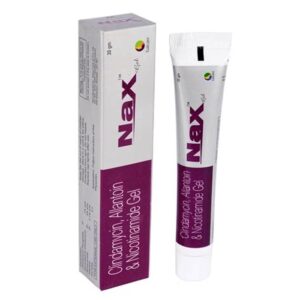NICOTINAMIDE + CLINDAMYCIN + ALLANTION
Nicotinamide: Nicotinamide, also known as niacinamide or nicotinic acid amide, is a form of vitamin B3. It is used as a supplement or medication to treat niacin deficiency, as well as certain skin conditions like acne and bullous pemphigoid.
The exact mechanism of action of nicotinamide is not fully understood. However, it is known to be converted into its active form, nicotinamide adenine dinucleotide (NAD+), which plays a crucial role in cellular metabolism and energy production. NAD+ is involved in various enzymatic reactions, including the transfer of electrons during cellular respiration.
The typical dose of nicotinamide depends on the specific condition being treated. For niacin deficiency, the recommended daily intake varies between 14-18 mg per day for adults. For certain skin conditions, doses ranging from 500-1000 mg per day are commonly used. However, it is important to follow the instructions provided by a healthcare professional, as the dose may be adjusted based on individual needs.
Nicotinamide is generally considered safe and well-tolerated, especially when taken within the recommended doses. However, like any medication, it may cause some side effects. Common side effects include flushing of the skin, gastrointestinal disturbances such as nausea, vomiting, and diarrhea. These side effects are usually mild and temporary.
In rare cases, high doses of nicotinamide may cause liver toxicity, abnormal liver function tests, and allergic reactions. If any serious side effects occur, it is important to seek immediate medical attention.
It is worth noting that nicotinamide should not be confused with nicotine, which is a highly addictive substance found in tobacco products. Nicotinamide does not have the same addictive properties and is used solely for its therapeutic benefits.
Clindamycin: Clindamycin is an antibiotic medication that is used to treat various bacterial infections. It belongs to the lincosamide class of antibiotics and works by inhibiting the growth of bacteria.
It is commonly used to treat infections caused by anaerobic bacteria, such as skin and soft tissue infections, respiratory tract infections, bone and joint infections, and infections of the female reproductive system, including pelvic inflammatory disease.
Clindamycin works by binding to the 50S subunit of the bacterial ribosome, which inhibits protein synthesis and ultimately leads to the death of the bacteria.
The dose of clindamycin depends on the specific infection being treated and the patient’s age, weight, and kidney function. It is available in various forms, including oral capsules, oral solution, and intravenous injection.
Common side effects of clindamycin include nausea, vomiting, diarrhea, stomach pain, skin rash, and itching. More serious side effects, although rare, can include severe allergic reactions, colitis (inflammation of the colon), and liver problems. It is important to seek medical attention if any severe or persistent side effects occur.
Clindamycin may interact with other medications, so it is essential to inform your healthcare provider about any other drugs or supplements you are taking before starting clindamycin treatment.
It is crucial to complete the full course of clindamycin treatment as prescribed by the healthcare provider, even if symptoms improve before the treatment is finished, to ensure the infection is fully eradicated and to prevent the development of antibiotic resistance.
Allantion: Allantoin is a pharmaceutical drug that is used primarily for its healing and soothing properties. It is commonly found in various skincare products and topical creams due to its ability to promote tissue repair and hydration.
Mechanism of Action:
Allantoin works by increasing the water content of the extracellular matrix, thereby promoting cell proliferation and wound healing. It also has a mild keratolytic effect, helping to remove dead skin cells and improve skin texture. Additionally, it has anti-inflammatory properties that can reduce redness and inflammation.
Use:
Allantoin is used topically to treat a variety of skin conditions, including minor cuts, burns, abrasions, acne, eczema, and psoriasis. It can also be found in mild antiseptic and anti-itch creams. Allantoin helps to soothe irritated skin, moisturize dry skin, and accelerate the healing process.
Dose:
The typical recommended dose of allantoin depends on the concentration present in the formulation. It is important to follow the instructions provided by the manufacturer or consult a healthcare professional for specific dosage recommendations.
Side Effects:
Allantoin is generally considered safe for topical use and is well-tolerated by most individuals. However, some people may experience mild skin irritation or allergic reactions, such as redness, itching, or rash. If any adverse effects occur, it is advisable to discontinue use and seek medical attention if necessary.
Overall, allantoin is a widely used pharmaceutical ingredient due to its healing and hydrating properties. It is an effective topical treatment for various skin conditions and is usually well-tolerated. However, it is essential to use allantoin-containing products as directed and consult a healthcare professional if any concerns or side effects arise.

